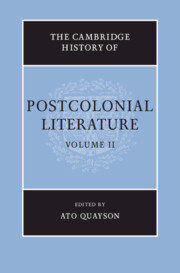Book contents
- Frontmatter
- 21 The language question in India and Africa
- 22 English and the development of postcolonial literature
- 23 Religion and postcolonial writing
- 24 Postcolonial responses to the Western canon
- 25 Island writing, Creole cultures
- 26 Magical realism
- 27 Palimpsest and hybridity in postcolonial writing
- 28 The narrative forms of postcolonial fiction
- 29 Poetry and postcolonialism
- 30 Primitivism and postcolonial literature
- 31 Popular culture and postcolonial literary production in Africa and India
- 32 Film and postcolonial writing
- 33 Fanon, Memmi, Glissant and postcolonial writing
- 34 Negritude and postcolonial literature
- 35 Publishing, prizes and postcolonial literary production
- 36 Key journals and organizations
- Bibliography
- Index
- References
22 - English and the development of postcolonial literature
Published online by Cambridge University Press: 28 January 2012
- Frontmatter
- 21 The language question in India and Africa
- 22 English and the development of postcolonial literature
- 23 Religion and postcolonial writing
- 24 Postcolonial responses to the Western canon
- 25 Island writing, Creole cultures
- 26 Magical realism
- 27 Palimpsest and hybridity in postcolonial writing
- 28 The narrative forms of postcolonial fiction
- 29 Poetry and postcolonialism
- 30 Primitivism and postcolonial literature
- 31 Popular culture and postcolonial literary production in Africa and India
- 32 Film and postcolonial writing
- 33 Fanon, Memmi, Glissant and postcolonial writing
- 34 Negritude and postcolonial literature
- 35 Publishing, prizes and postcolonial literary production
- 36 Key journals and organizations
- Bibliography
- Index
- References
Summary
Introduction
When nations meet on terms of independence and equality, they tend to stress the need for communication in the language of the other. They choose the language of the other merely to ease communication in their dealings with one another. But when they meet as oppressor and oppressed, ’ , then their languages cannot experience a genuinely democratic encounter.
This chapter traces the intersection between the spread of English in postcolonial communities and its employment as a vehicle of postcolonial literature. Rather than listing developments in individual countries, or forms of English that have arisen there, the chapter looks at metadiscourse, at the methodological issues and ideological undercurrents that have contributed to shape the ways in which we describe such language phenomena and literary products. In spite of the fundamental differences in outlook, there are many similarities between the study of ‘English languages’ and that of ‘English literatures’, and there has been quite an amount of cross-fertilization, because on the one hand the symbolic value of language has been a key aspect in the development of postcolonial literatures, and on the other hand this development has been conducive to the emerging of new identities conveyed by language variation.
For these reasons, the second part of the chapter is devoted to literary statements on English, intended both as metacomments on the writers’ lives and works, and as representations of language use within their works. The first part outlines some main concepts and models within linguistic studies on postcolonial English, and some points of contact with literary theory, starting from issues related to terminology, which are far from being irrelevant or neutral.
- Type
- Chapter
- Information
- The Cambridge History of Postcolonial Literature , pp. 703 - 738Publisher: Cambridge University PressPrint publication year: 2012

